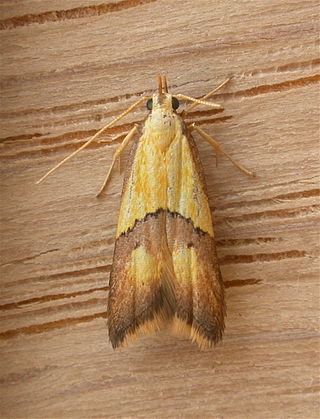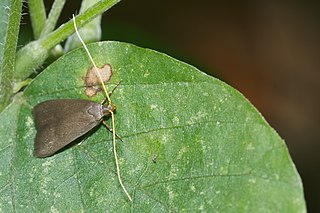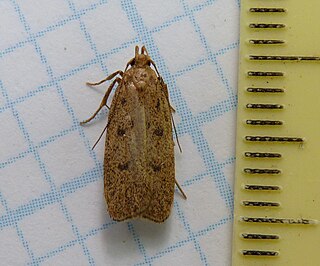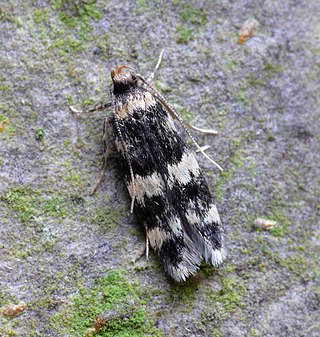The Holcopogoninae are a subfamily of moths. They belong to the huge the superfamily Gelechioidea, of which they represent a minor but apparently quite distinct lineage.

The Lecithoceridae, or long-horned moths, are a family of small moths described by Simon Le Marchand in 1947. Although lecithocerids are found throughout the world, the great majority are found in the Indomalayan realm and the southern part of the Palaearctic realm.

Monochroa is a genus of moths in the family Gelechiidae.

The Lecithocerinae are a subfamily of small moths in the family Lecithoceridae. They are found worldwide, but most species occur in South Asia. The subfamily is characterized by the male genitalia with a bridge-like structure connecting the tegumen and the valva, and the uncus almost always is vestigial with two lobes at the dorsal base, only exceptionally united into a broad plate, but never as a thorn or spine.

Lecithocera is a genus of moths in the lecithocerid subfamily Lecithocerinae. The genus was erected by Gottlieb August Wilhelm Herrich-Schäffer in 1853.
Torodora is a genus of moths in the family Lecithoceridae. The genus was erected by Edward Meyrick in 1894.

Monochroa lucidella is a moth of the family Gelechiidae. It is found in most of Europe, except Spain, Switzerland and most of the Balkan Peninsula. It is recorded from the Near East and Siberia (Transbaikalia).

The Symmocinae are a subfamily of moths in the superfamily Gelechioidea. These small moths are found mainly in the Palearctic and Africa.

Symmoca is a genus of moths in the family Autostichidae.

Monochroa divisella, the scarce marsh neb, is a moth of the family Gelechiidae. It is found in Denmark, Latvia, Germany, the Netherlands, Belgium, Great Britain, the Czech Republic, Hungary, Bulgaria and France. Outside of Europe, it is known from Korea, the Russian Far East and Japan. The habitat consists of fens, marshes, river-banks and other damp areas.

Monochroa rumicetella is a moth of the family Gelechiidae. It was described by O. Hofmann in 1868. It is found from Fennoscandia and Belarus to Portugal, the Alps and Greece, and from France to Romania.

Monochroa tenebrella, the common plain neb, is a moth of the family Gelechiidae. It was described by Jacob Hübner in 1817. It is found in most of Europe. The habitat consists of open grassy areas and heathland.

Anomologinae is a subfamily of moths in the family Gelechiidae.

Autostichidae is a family of moths in the moth superfamily Gelechioidea.
Heringita is a moth genus in the family Autostichidae.
The Torodorinae are a subfamily of small moths in the family Lecithoceridae.

Stodmarsh SSSI is a 623.2-hectare (1,540-acre) biological Site of Special Scientific Interest near Stodmarsh, north-east of Canterbury in Kent. Parts of it are a Nature Conservation Review site, Grade I, a National Nature Reserve, a Ramsar internationally important wetland site, a Special Area of Conservation and a Special Protection Area under the European Union Directive on the Conservation of Wild Birds.












